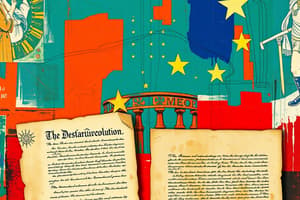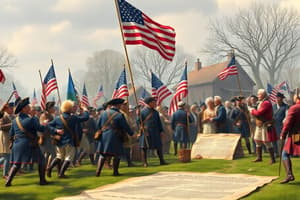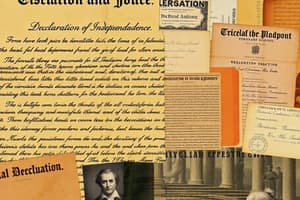Podcast
Questions and Answers
The American Revolution began in 1775 when the American colonies revolted against the British Empire, seeking ______ and self-governance.
The American Revolution began in 1775 when the American colonies revolted against the British Empire, seeking ______ and self-governance.
independence
The British Army engaged rebel colonists at ______ on April 19, 1775, sparking armed conflict.
The British Army engaged rebel colonists at ______ on April 19, 1775, sparking armed conflict.
Lexington
The Declaration of Independence asserts that all men have unalienable rights like life, liberty, and ______.
The Declaration of Independence asserts that all men have unalienable rights like life, liberty, and ______.
happiness
The British Declaration of Independence aimed to justify the colonies' independence from British rule by promoting Enlightenment principles and ______.
The British Declaration of Independence aimed to justify the colonies' independence from British rule by promoting Enlightenment principles and ______.
John Harrington's letter expresses skepticism about the Declaration, arguing that colonies benefit from British ______ and warns against rebellion.
John Harrington's letter expresses skepticism about the Declaration, arguing that colonies benefit from British ______ and warns against rebellion.
Flashcards
American Revolution
American Revolution
A conflict between American colonies and Britain for independence, starting in 1775.
Lexington and Concord
Lexington and Concord
The first military engagements of the American Revolution on April 19, 1775.
Declaration of Independence
Declaration of Independence
A document asserting the colonies' right to self-governance, authored by Thomas Jefferson.
Loyalist Perspective
Loyalist Perspective
Signup and view all the flashcards
Enlightenment Influence
Enlightenment Influence
Signup and view all the flashcards
Study Notes
The American Revolution
- A pivotal historical event, beginning in 1775, marked by the American colonies' revolt against British rule to achieve independence and self-governance.
- Key figures included George Washington, Thomas Jefferson, and Benjamin Franklin.
- The conflict commenced with the Battle of Lexington (April 19, 1775), where British forces confronted colonial militia.
- Further clashes ensued in Concord, highlighting the colonial militias' fight against the British.
The Declaration of Independence
- Written by Thomas Jefferson, this document asserts the fundamental equality and inalienable rights of all people (life, liberty, and the pursuit of happiness).
- It articulates the concept that governments exist to safeguard these rights, with the populace possessing the power to alter or abolish governments that fail to do so.
- The document's purpose directly influenced its content—a justification for the colonies' pursuit of independence from British rule grounded in Enlightenment principles.
Loyalist Perspectives and the Declaration
- John Harrington, a New York loyalist, expressed concern and opposition to the Declaration's ideals. In his letter to Charles, he highlighted the potential suffering and disadvantages of rebellion, arguing that the colonies benefited demonstrably under British protection.
- Harrington's letter provides a critical counterpoint to the Declaration's rhetoric, showing the concerns and anxieties held by individuals who remained loyal to the British crown.
- This source offers a significant alternative perspective that illuminates the diverse viewpoints on the path towards independence. These perspectives broadened our understanding of the declaration's overall impact.
Studying That Suits You
Use AI to generate personalized quizzes and flashcards to suit your learning preferences.




